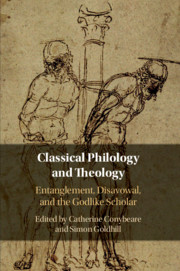Book contents
- Classical Philology and Theology
- Classical Philology and Theology
- Copyright page
- Contents
- Contributors
- Chapter 1 Philology’s Shadow
- Chapter 2 Philology’s Roommate: Hermeneutics, Antiquity, and the Seminar
- Chapter 3 The Union and Divorce of Classical Philology and Theology
- Chapter 4 The Philology of Judaism: Zacharias Frankel, the Septuagint, and the Jewish Study of Ancient Greek in the Nineteenth Century
- Chapter 5 Source, Original, and Authenticity between Philology and Theology
- Chapter 6 Whose Handmaiden? ‘Hellenisation’ between Philology and Theology
- Chapter 7 Julian the Emperor on Statues (of Himself)
- Chapter 8 Boethius in the Genres of the Book: Philology, Theology, Codicology
- Chapter 9 Virgil, Creator of the World
- Chapter 10 Theology’s Shadow
- Bibliography
- Index
Chapter 7 - Julian the Emperor on Statues (of Himself)
Published online by Cambridge University Press: 03 September 2020
- Classical Philology and Theology
- Classical Philology and Theology
- Copyright page
- Contents
- Contributors
- Chapter 1 Philology’s Shadow
- Chapter 2 Philology’s Roommate: Hermeneutics, Antiquity, and the Seminar
- Chapter 3 The Union and Divorce of Classical Philology and Theology
- Chapter 4 The Philology of Judaism: Zacharias Frankel, the Septuagint, and the Jewish Study of Ancient Greek in the Nineteenth Century
- Chapter 5 Source, Original, and Authenticity between Philology and Theology
- Chapter 6 Whose Handmaiden? ‘Hellenisation’ between Philology and Theology
- Chapter 7 Julian the Emperor on Statues (of Himself)
- Chapter 8 Boethius in the Genres of the Book: Philology, Theology, Codicology
- Chapter 9 Virgil, Creator of the World
- Chapter 10 Theology’s Shadow
- Bibliography
- Index
Summary
This chapter looks at the ways in which Hellenisms are constructed, specifically with reference to the language of religion and divinity. It poses the question: how Christian is the determinedly nostalgic late-ancient Hellenism of the emperor known as Julian the Apostate (ruled 361-363)? If the emperor continued to be considered as a god, how did that inflect the understanding of Christ’s incarnation—and vice versa? The very language of the divine becomes fraught with ambiguity, and the distinctions imposed by interpreters between philology and theology seem increasingly tendentious. Ultimately it shows show how the dynamic interaction of theology and classical antiquity can produce an almost unthinkable collocation of ideas: that an ensouled statue of the emperor should provide some sort of model for comprehending the incarnation of Christ.
Information
- Type
- Chapter
- Information
- Classical Philology and TheologyEntanglement, Disavowal, and the Godlike Scholar, pp. 126 - 148Publisher: Cambridge University PressPrint publication year: 2020
